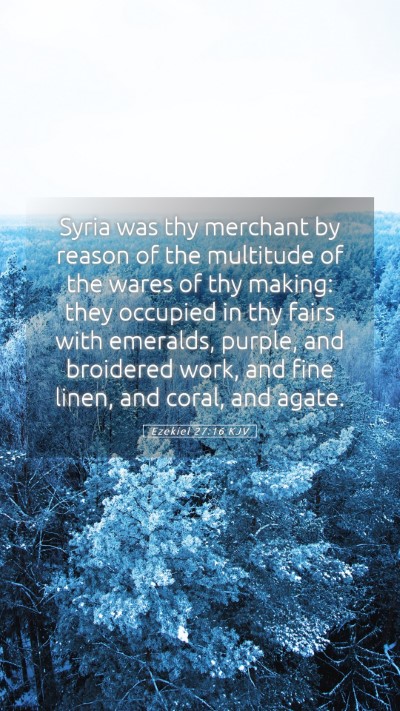Ezekiel 27:16 - Bible Verse Commentary and Interpretation
Ezekiel 27:16 states: "The Syrians served as your soldiers. They were your men of war. They had the most beautiful ships in the world. They were the ones who steered their vessels so that they were able to go out to sea on a steady way." This verse reflects on the grandeur and strength of the city of Tyre, represented as a prosperous commercial hub with powerful alliances and military support.
In order to fully understand Ezekiel 27:16, we will explore its significance through insights derived from reliable public domain commentaries, such as those by Matthew Henry, Albert Barnes, and Adam Clarke. Their perspectives provide a deeper insight into the verse's historical and cultural context, serving as vital Bible study resources for those seeking to comprehend Bible verse meanings and interpretations.
Understanding the Verse in Context
The book of Ezekiel contains prophecies directed to both Israel and other nations, often using metaphorical language to convey messages of judgment and prosperity. In chapter 27, Ezekiel elaborates on the trade and wealth of Tyre, likening it to a grand ship. This powerful imagery not only displays Tyre’s might but also serves as a warning of impending judgment from God due to their pride and reliance on worldly power rather than divine authority.
Commentary Insights
Matthew Henry's Commentary
Matthew Henry notes that Tyre's alliances with the Syrians (referred to soldiers in the verse) highlight the city's substantial military strength at that time. This commentary emphasizes that Tyre's success was not solely due to its commerce but also its strategic partnerships. Henry cautions readers about the fleeting nature of such power, as God can remove their strength in an instant, warning that human reliance on alliances can lead to downfall.
Albert Barnes' Notes on the Bible
Albert Barnes expresses that the mention of the Syrians signifies the diverse connections Tyre enjoyed with neighboring nations. He states that these connections were pivotal for Tyre's navy, suggesting that such relationships fostered the city’s reputation for being untouchable. Barnes illustrates the idea that reliance on earthly alliances can be deceptive, leading to a false sense of security, thus offering a profound commentary on the ethical implications of prosperity without God's favor.
Adam Clarke's Commentary
Adam Clarke further analyzes the text by exploring the characteristics of the "Syrians" and what they contributed to Tyre's maritime ventures. He explains that despite the military and economic strength illustrated in the verse, the sins and pride of Tyre ultimately led to its demise, foreshadowing the eventual judgment that would come upon them. Clarke’s commentary serves as a reminder that while wealth and strength may appear advantageous, they can become a source of corruption and downfall without adherence to God’s commandments.
Applications and Reflections
From a modern perspective, Ezekiel 27:16 challenges readers to consider the sources of their strength and security. It prompts individuals to reflect on their dependencies—be it financial, relational, or vocational—which may overshadow their necessity for spiritual reliance on God. As part of Bible study lessons, believers are encouraged to apply the teachings of this verse in their daily lives, reassessing their priorities and trust in divine providence over worldly forms of support.
Related Bible Verses
- Isaiah 23:1-18: A prophecy against Tyre that elaborates on its fate.
- Ezekiel 28:17: Discusses pride and its consequences, similar to Tyre's situation.
- Proverbs 11:28: States that those who trust in wealth will fall, emphasizing reliance on God instead.
Conclusion
In summary, Ezekiel 27:16 serves as a potent reminder of the impermanence of worldly power and alliances. Structured through comprehensive Bible verse interpretations, as seen in the insights from commentators like Matthew Henry, Albert Barnes, and Adam Clarke, the passage invites all who seek Bible verse explanations to engage earnestly with Scripture. By doing so, believers can uncover rich biblical truths and practical applications for their lives, fostering a deeper biblical exegesis and understanding of God's words.


